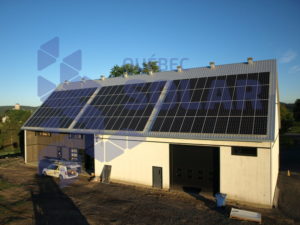Solar panels - Agricultural Solutions
Quebec`s most rugged and innovative solutions for the farming community!
Installing solar on a Quebec Farm is the next step in the evolution of sustainability. We are already harvesting and eating locally grown food, so it only makes sense that our next step is to produce our own electricity right where we need it, on the farms that feed us. Investing in solar energy systems will give you the opportunity to lower your operating costs since your solar energy system will produce a percentage of your electricity use and this way reduce your electric bills.
You will further reduce your carbon footprint and increase your environmental credibility as an eco-responsible agricultural company. This would demonstrate that your company takes responsibility for its actions by actively fighting to preserve the environment with concrete means. Choosing to be eco-responsible means showing exemplary and promising leadership. This would make you even more attractive to consumers and investors who prefer to join environmentally friendly companies.
In this regard, Quebec Solar specializes in the development of economic strategies as well as energy assessments. We would be happy to help you grow your business. Be aware that Natural Resources Canada offers tax incentives to Canadian companies owning clean energy related equipment. These incentives are in the form of an accelerated capital cost allowance (CCA) and are applicable to any commercial solar energy system.
To find out about our solar power system installation process please click here.
Agricultural Solar Tax Credit in Quebec:
Capital Cost Allowance (CCA) is the amount of depreciation costs that the government allows a business to deduct from its revenues for tax reporting purposes. Its fees include the capital cost of the eligible energy conservation and clean energy production asset as well as all costs associated with the purchase and installation of the asset such as:
- The purchase price of the property
- Costs related to the design, technical studies and commissioning of the property
- The cost of modifications or improvements made to the property after its purchase
- Legal, accounting or other costs related to the purchase of the property
- The cost of other services necessary to make the asset operational
The claimable CCA depends on the date the project is put into operation. Until January 1st 2025, the CCA is 50% while that will be 30% for any project starting after this date.
The claim for CCA is based on a prescribed rate, which is generally based on the useful life of the asset. In the case of solar energy systems, the lifespan is 20 to 25 years depending on the manufacturer chosen.
That said, it is important to mention the fact that under the half-year rule, only half of the normal CCA deduction is allowed in the first year.
In line with what has been mentioned above, the table below shows the savings generated for a average cost and average life span solar energy system project. For convenience, the values of the undepreciated capital cost (UCC) and CCA have been rounded down.
| Year | UCC (CAD) | CCA (CAD) |
|---|---|---|
| 1 | 150 000 | 37 500 |
| 2 | 112 500 | 56 250 |
| 3 | 56 250 | 28 125 |
| 4 | 28 125 | 14 062 |
| 5 | 14 062 | 7031 |
| 6 | 7031 | 3515 |
| 7 | 3515 | 1757 |
| 8 | 1757 | 878 |
| 9 | 878 | 439 |
| 10 | 439 | 219 |
| 11 | 219 | 109 |
| 12 | 109 | 54 |
| 13 | 54 | 27 |
| 14 | 27 | 13 |
| 15 | 13 | 6 |
| 16 | 6 | 3 |
| 17 | 3 | 1 |
| 18 | 1 | 0.5 |
| 19 | 0.5 | 0.25 |
| 20 | 0.12 | 0.06 |
| Total | 0 | 150 000 |
The table above shows that the CCA offered by the Government of Canada covers 90% of the project costs after 5 years, which is remarkable. Even though you will have to assume the costs of the entire project in the first year, be aware that these will be amortized at the quarter of the project’s lifespan. It is therefore obvious that opting for a solar energy system has never been easier than before.
To find out about our solar power system installation process please click here, orcontact us for further information and a free energy assessment today! We will be happy to help you accelerate your achievement of energy self-sufficiency.

